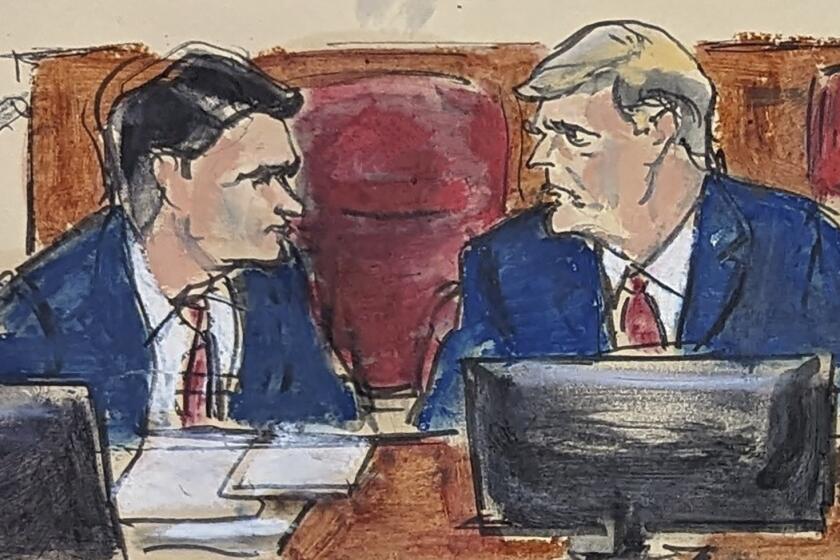Friends Byrd and Warner Play Key Roles Forging Pact
Even as he stood on the Senate floor Monday afternoon, decrying the anticipated vote that might end judicial filibusters and alter the nature of the institution he loved, Sen. Robert C. Byrd (D-W.Va.) knew that a compromise was all but completed -- and that he had played a key role in crafting it.
“My heart is sad that we would even come to a moment such as this,” Byrd said, referring to the vote that Republicans had planned for today to ban the filibuster for nominees to the federal bench. “Sad, sad, sad, sad it is.”
Speaking to a nearly empty chamber, he appealed to his colleagues “to pause for a moment and reflect seriously on the role of the Senate as it has existed now for 217 years” and warned of the ill will that would be caused if the so-called nuclear option of ending the judicial filibuster was approved.
Behind the scenes, the 87-year-old Byrd -- who walks slowly, with the aid of a wooden cane, and whose hands shake -- had been making much the same appeal to the group of a dozen Democratic and Republican senators who were searching for a way to avoid the political confrontation.
And his role, along with that of Sen. John W. Warner (R-Va.), was critical in reaching the compromise, said several of the other senators who helped craft the deal.
The two men, who often have taken time on the Senate floor to praise each other in the flowery rhetoric that once was commonplace in the chamber, brought their friendship, their political gravitas and their decades of negotiating skills to the talks.
“Their role was important in two ways,” said Sen. Ken Salazar (D-Colo.), a freshman who arrived just in time to watch it nearly come unraveled over the issue of judicial filibusters.
“First, they have a seniority with this place ... their presence alone was very important in [lending] credence” to the work of the moderates, he said.
But beyond that, Salazar said, the pair crafted language dealing with the Senate’s “advise and consent” role for presidential appointees.
The Constitution “speaks to consultation between the Senate and the president with regard to the use of the president’s power to make nominations,” the agreement reads.
“We encourage the executive branch of government to consult with members of the Senate, both Democratic and Republican, prior to submitting a judicial nomination to the Senate for consideration,” it says.
Sen. Olympia J. Snowe (R-Maine) agreed that Warner and Byrd gave impetus to the group to continue negotiations even after party leaders declared a compromise all but dead and as pressure from outside interest groups -- in the forms of organized e-mail, telephone and television advertising campaigns -- mounted to a fever pitch Monday.
Byrd and Warner, 77, “brought a breadth of institutional experience in the United States Senate and a great deal of weight” to the talks, Snowe said.
Byrd has served in the Senate since 1959, Warner since 1979. Both have known what it is like to serve in the minority party, Snowe said, and were able to impress their experience on other senators.
Warner told reporters that he and Byrd had talked over the weekend a half-dozen times, discussing the language of the agreement.
“I’m proud to have been a part of this,” Warner said on the Senate floor after the compromise was announced. “And I do hope that our wonderful Senate can resume its long and distinguished service to our nation.”
Byrd too seemed pleased. Making his way carefully through the swarm of reporters after the moderates’ news conference, Byrd said that he had prayed that a solution would be found.
All the senators involved in the agreement, Byrd said, “shared the feeling that we needed to rise above politics and act to save the Senate.”
His voice rising, he repeated the phrase: “Save the Senate! Save it from this nuclear option that would have been a catastrophe.”
Asked whether he had felt pressured by those who opposed any compromise on the issue, Byrd laughed.
“Who do you think could pressure me?” he asked. Then he turned and headed down the marble hall.
*
Times staff writer Richard Simon contributed to this report.
More to Read
Get the L.A. Times Politics newsletter
Deeply reported insights into legislation, politics and policy from Sacramento, Washington and beyond. In your inbox three times per week.
You may occasionally receive promotional content from the Los Angeles Times.






